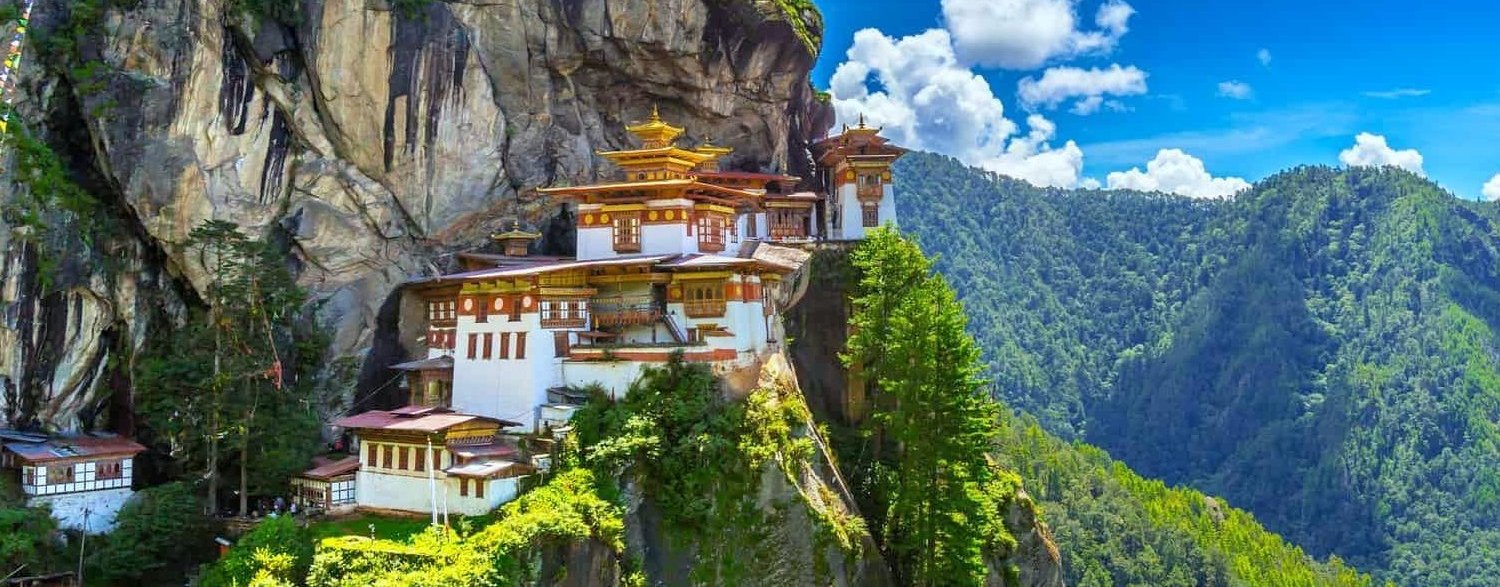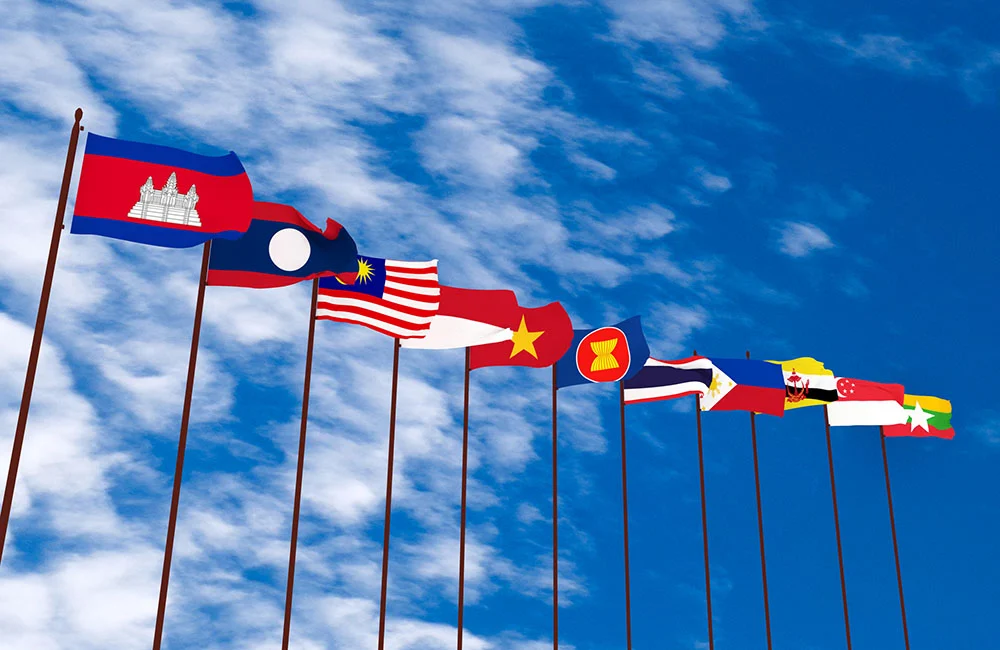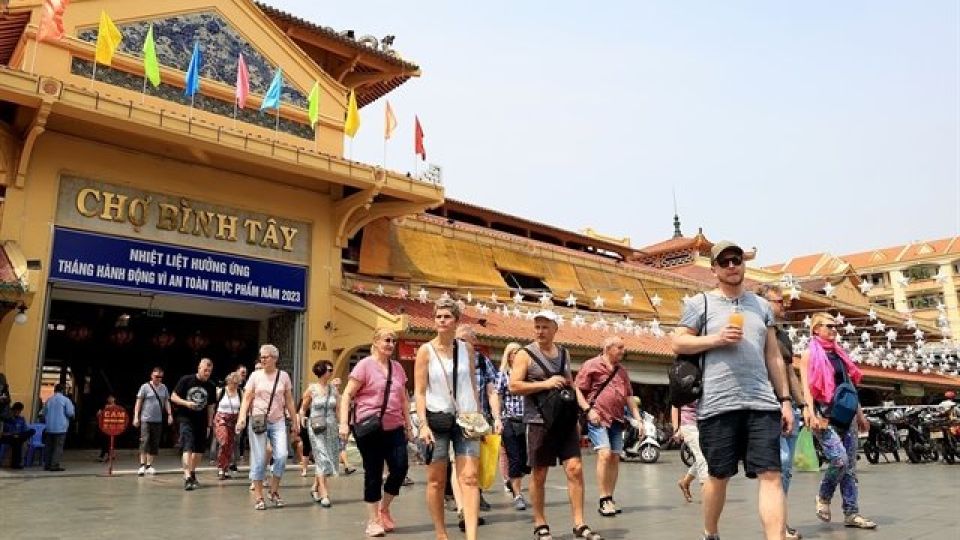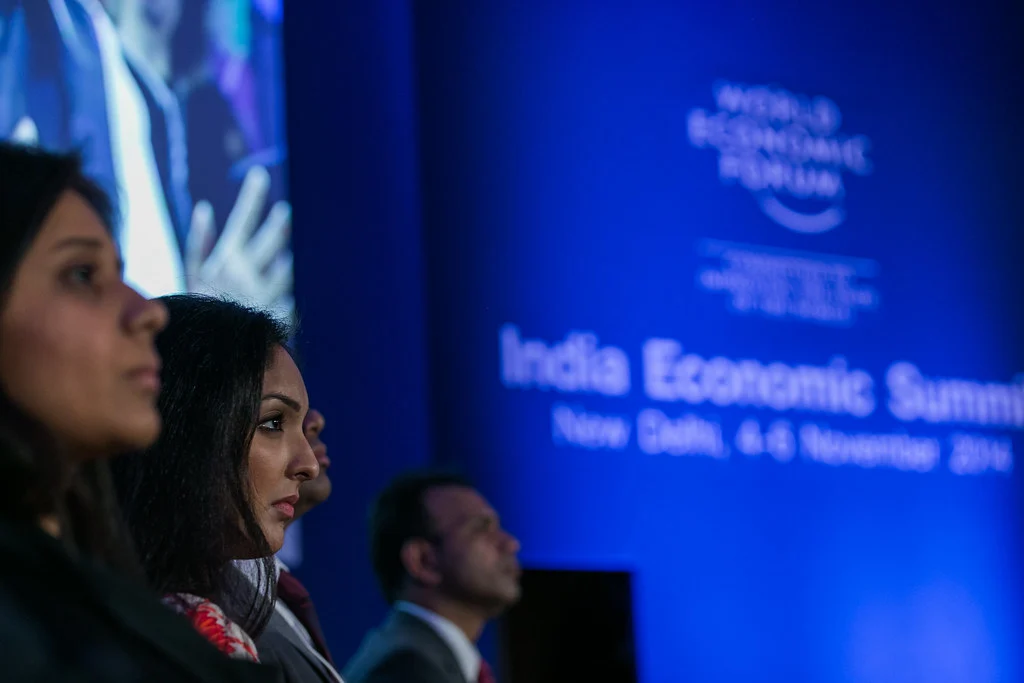A Small Country with a Big Impact
Bhutan, a small South Asian country located in the Himalayas between China and India,[1] has received significant global attention despite its low population of 800,000.[2] Tourists visit the country for its beautiful natural landscape,[3] and it takes a unique approach to protect that. In 2017, they became the world’s first carbon-negative country,[4] i.e. their greenhouse gas emissions are negative.[5] This is a result of their prolific forests that act as a carbon sink. These forests are not a coincidental outcome but rather a deliberate policy taken by the government. Bhutan’s Constitution requires a minimum of 60 percent of the country’s land area to remain under forest cover. As of 2017, the land exceeds this threshold, with 81 percent of the country under forest cover.[6]
Not only is Bhutan regarded as one of the greenest countries in the world, it is also one of the happiest.[7] Their Gross National Happiness (GNH) philosophy, derived from the country’s Buddhist values, centres spiritual enlightenment alongside material happiness.[8] The Bhutanese government evaluates all their policies on the GNH index, considering sustainability, cultural preservation, and environmental conservation, especially regarding their tourism policy.[9] This stands in sharp contrast to the global tourism industry, which, although it has its benefits, is often associated with the commodification of culture and the deepening of inequality through neoliberalism.[10] This article examines the inner contradictions of Bhutan’s approach to tourism, questioning whether Bhutan can stay committed to its goals of preserving sustainability and well-being under the backdrop of a global tourism industry that often disregards these priorities.
Bhutan, a Model for Sustainable Tourism?
Bhutan’s “High Value, Low Volume” approach to tourism blends its commitment to sustainability and cultural preservation with economic development through the tourism sector. “High Value” focuses on prioritizing tourists who are mindful and responsible, while “Low Value” ensures a low number of tourists to preserve tourism infrastructure.[11] The country has implemented a tourist tax, also called the Sustainable Development Fee, charging each tourist a fee of USD$250 a day.[12] This tax revenue is repurposed to maintain carbon neutrality by planting trees and upgrading infrastructure to reduce dependency on fossil fuels.[13] Furthermore, this tourist policy reinforces the core values of GNH, promoting equity in economic development and the conservation of culture and environment. In this way, Bhutan has “built sustainability into its national identity,”[14] linking its environmental commitments to its philosophical roots.
Tourism is also seen as providing employment opportunities, especially for youth, balancing economic growth with sustainability and cultural preservation goals.[15] Challenging traditional Western conceptions of development focused solely on measures of economic growth,[16] Bhutan has begun to be viewed as a model for global sustainability. Regarded by organizations such as National Geographic and Climate Council for its bold commitment to carbon-negativity and its ambitious sustainability practices, on the surface, Bhutan appears to be a beacon of hope in a world that is increasingly plagued by growing emissions and fractured climate change accords. Nevertheless, is this too good to be true?
…Or Merely a Pawn in a Global Capitalist System?
For all of its appeal as a mystic and romantic escape from a deeply commodified world, Bhutan is beginning to show signs of problems that increasingly mirror the flaws of a global neoliberal system. While Bhutan’s natural landscape is unquestionably beautiful, some scholars suggest this idealized construction by tourists and the West, often playing into narratives of Western melancholic nostalgia, overlooks the challenges of Bhutan’s modern society caused by tourism.[17] The industry has not created equal gains for all Bhutanese, and in some cases, it may even be widening inequality. For instance, an article in The Bhutanese points to the water shortages found in many towns, preventing locals from receiving water in their homes, which are further exacerbated by luxury hotels attempting to meet the demand of tourists with swimming pools that take from municipal water sources.[18] Further, the goal of promoting Bhutan as a high-end tourism destination led to the closure of many one or two-star hotels, which were no longer allowed to cater to tourists under new policies that favoured luxury hotels and resorts.[19] These cases suggest that the tourism industry, which initially sought to support local well-being and employment, can have the opposite effect as intended.
Some also suggest that the principle of GNH is increasingly beginning to resemble modern GDP. The original tourism slogan, “Happiness is a place,”[20] implies the consolidation of the values of happiness into a commodifiable product that seeks to attract tourists for revenue. Moreover, some scholars point out that despite many locals committing to tourism initiatives marketed as sustainable and beneficial for their communities,[21] the concepts of ecotourism and GNP are often not well understood by local Bhutanese.[22] Some locals even expressed concern over increased inequality, and an erosion of traditional values towards the relationship between humans and the environment, resulting in the degradation of cultural values.[23]
These concerns, expressed by both locals and scholars, suggest ecotourism and GNH are starting to shift away from traditional Buddhist values. Instead, they are creating an elitist environment that accommodates the luxury demand of wealthy tourists, while harming local businesses and weakening ties to cultural heritage.[24] Thus, the tourism industry begins to violate the principles it originally stood for; instead, it incorporates itself into the same Western capitalist logic that it often counters.
It May Not Be Perfect, But it Can Give Us Hope.
All this discussion begs the question: Is Bhutan really promoting sustainability through its tourist tax? Critics might say their tourism industry has succumbed to the accumulation of profits from the luxury demand of the highly wealthy, eroding any original commitments to sustainability. Others might argue that the country is merely trying to find a way to survive as a country with low amounts of economic and military power in the inescapable grasp of a global capitalist system. Tshering Tobgay’s (Prime Minister of Bhutan) quote from the 2009 COP25 Conference in Copenhagen can help answer this:
“We first made this promise in 2009 during COP25 in Copenhagen. But nobody noticed. Governments were so busy arguing with one another and blaming each other for causing climate change that when a small country raised our hands and announced, ‘we promise to remain carbon neutral for all time,’ nobody heard us.”[25]
Bhutan’s sustainability policies are not perfectly sustainable. Their priorities are not perfectly pristine. However, in a world of self-interested states becoming less cooperative in an increasingly complex and interconnected society, we cannot afford to wait for perfection. Perhaps we should attempt to learn from Bhutan’s original intentions of safeguarding well-being and happiness before their policies become increasingly distorted in an attempt to adapt to a global capitalist system, and it becomes too late.
Sarah Padwal is a second year undergraduate student majoring in International Relations and Peace Conflict and Justice, with a minor in Contemporary Asian Studies. Throughout her degree, she seeks to understand the intersection between economics, politics and history in international relations, with a focus on the Asia-Pacific region. She is hoping to expand her knowledge of post-colonial identity and social relations as a Contributor for South Asia this year.
Bibliography
Brunet, Sandra, Johannes Bauer, Terry De Lacy, and Karma Tshering. “Tourism Development in Bhutan: Tensions between Tradition and Modernity.” Journal of Sustainable Tourism 9, no. 3 (September 29, 2001): 243–63. https://doi.org/10.1080/09669580108667401.
Climate Council. “How Did Bhutan Become the First Carbon Negative Country?” Climate Council, April 2, 2017. https://www.climatecouncil.org.au/bhutan-is-the-world-s-only-carbon-negative-country-so-how-did-they-do-it/.
Developer. “Stopping Bhutan from Heading the Mass Tourism Way.” The Bhutanese, April 27, 2019. https://thebhutanese.bt/stopping-bhutan-from-heading-the-mass-tourism-way/.
Gurung, Dhan Bahadur, and Klaus Seeland. “Ecotourism Benefits and Livelihood Improvement for Sustainable Development in the Nature Conservation Areas of Bhutan.” Sustainable Development 19, no. 5 (December 31, 2009): 348–58. https://doi.org/10.1002/sd.443.
Montes, Jesse, and Bhuwan Kafley. “Ecotourism Discourses in Bhutan: Contested Perceptions and Values.” Tourism Geographies 24, no. 6-7 (May 21, 2019): 1–24. https://doi.org/10.1080/14616688.2019.1618905.
Srivastava, Roli. “How Bhutan Aims to Balance Economy and Environment through Tourism.” World Economic Forum, September 13, 2023. https://www.weforum.org/stories/2023/09/bhutan-sustainable-tourist-destination/.
Tavassoli, Nader. “Pricing Solutions to Bhutan’s Sustainable Tourism Policy.” London Business School, 2023. https://www.london.edu/think/pricing-solutions-to-bhutans-sustainable-tourism-policy.
TEDx. This Country Isn’t Just Carbon Neutral — It’s Carbon Negative. Youtube. Youtube.com, 2016. https://www.youtube.com/watch?v=7Lc_dlVrg5M.
Wearing, Stephen, Matthew McDonald, Greig Taylor, and Tzach Ronen. “Neoliberalism and Global Tourism.” In Handbook of Globalisation and Tourism, 1–360. Edward Elgar Publishing, 2019.
Youn, Soo. “Visit the World’s Only Carbon-Negative Country.” National Geographic, October 17, 2017. https://www.nationalgeographic.com/travel/article/carbon-negative-country-sustainability.
-
Sandra Brunet et al., “Tourism Development in Bhutan: Tensions between Tradition and Modernity,” Journal of Sustainable Tourism 9, no. 3 (September 29, 2001), 247. ↑
-
Roli Srivastava, “How Bhutan Aims to Balance Economy and Environment through Tourism,” World Economic Forum, September 13, 2023, https://www.weforum.org/stories/2023/09/bhutan-sustainable-tourist-destination/. ↑
-
Brunet et al., 245. ↑
-
Nader Tavassoli, “Pricing Solutions to Bhutan’s Sustainable Tourism Policy,” London Business School, 2023, https://www.london.edu/think/pricing-solutions-to-bhutans-sustainable-tourism-policy. ↑
-
Climate Council, “How Did Bhutan Become the First Carbon Negative Country?,” Climate Council, April 2, 2017, https://www.climatecouncil.org.au/bhutan-is-the-world-s-only-carbon-negative-country-so-how-did-they-do-it/. ↑
-
Climate Council. ↑
-
Soo Youn, “Visit the World’s Only Carbon-Negative Country,” National Geographic, October 17, 2017, https://www.nationalgeographic.com/travel/article/carbon-negative-country-sustainability. ↑
-
Jesse Montes and Bhuwan Kafley, “Ecotourism Discourses in Bhutan: Contested Perceptions and Values,” Tourism Geographies 24, no. 6-7 (May 21, 2019), 1174. ↑
-
Tavassoli. ↑
-
Stephen Wearing et al., “Neoliberalism and Global Tourism,” in Handbook of Globalisation and Tourism (Edward Elgar Publishing, 2019), 27. ↑
-
Tavassoli. ↑
-
Srivastava. ↑
-
Srivastava. ↑
-
Youn. ↑
-
Brunet et al., 259. ↑
-
Ibid, 261. ↑
-
Brunet et al., 245. ↑
-
Developer, “Stopping Bhutan from Heading the Mass Tourism Way,” The Bhutanese, April 27, 2019. ↑
-
Tavassoli. ↑
-
Ibid. ↑
-
Ibid, 1180. ↑
-
Montes and Kafley, 1180, 1189. ↑
-
Ibid, 1183-1184. ↑
-
Ibid, 1174. ↑
-
TEDx, This Country Isn’t Just Carbon Neutral — It’s Carbon Negative, Youtube, Youtube.com, 2016, [10:23-10:47]. ↑








